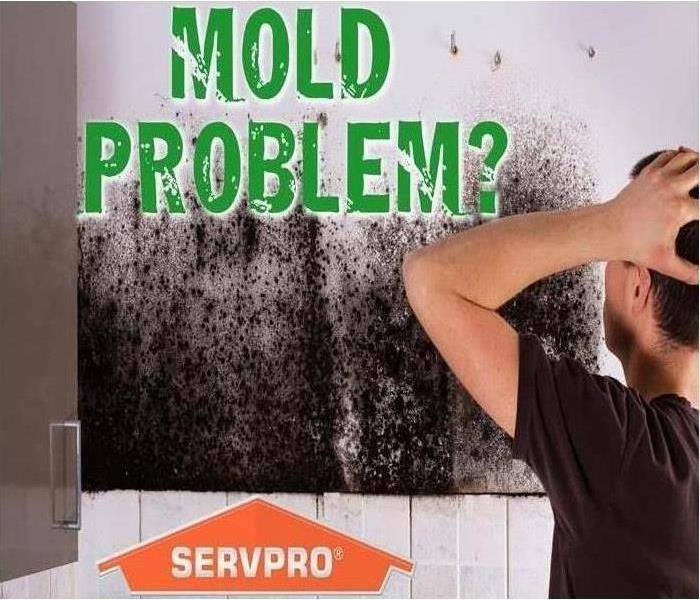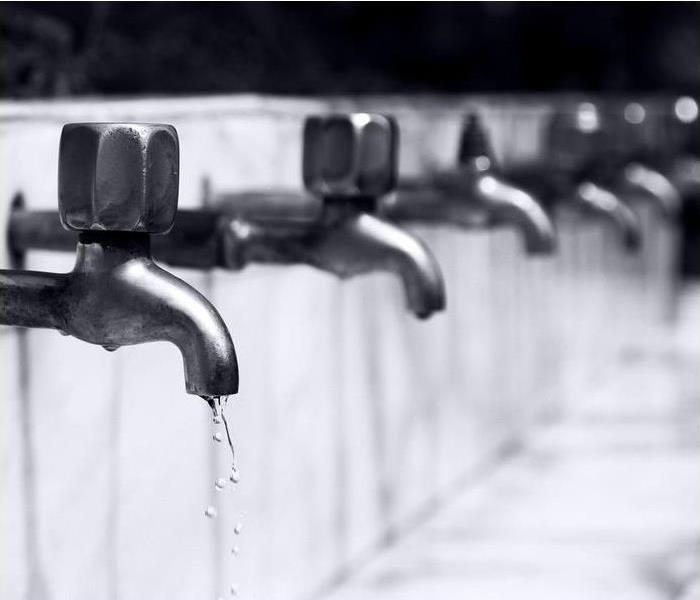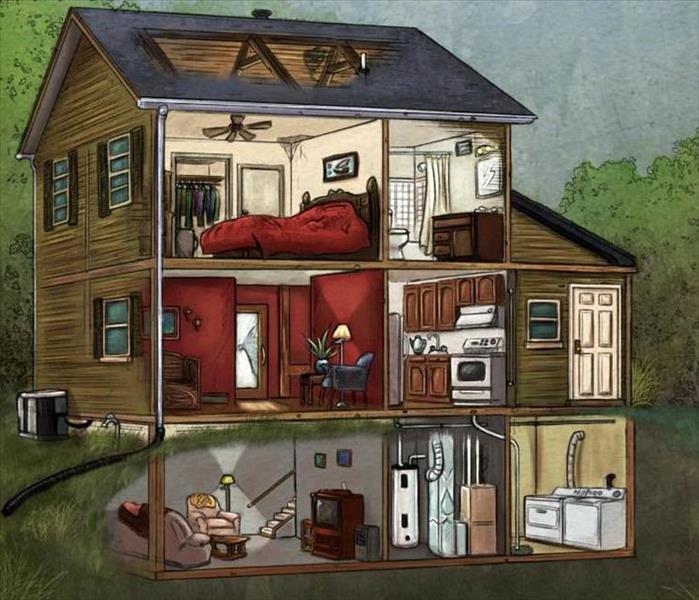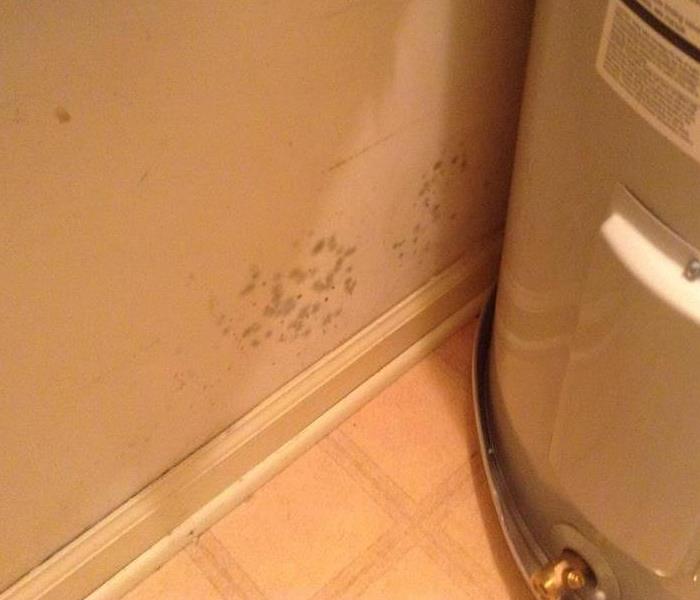Recent Mold Remediation Posts
Ways to Prevent Mold Growth in Commercial Buildings
11/4/2024 (Permalink)
According to JSE Labs here are some tips to prevent mold growth in your commercial building:
1. Get Regular Inspections and Surveys
Staying vigilant is one of the best ways to prevent mold from growing on your property. It’s a good idea to learn how to spot potential signs of mold such as warped or stained walls, persistent musty smells, and new or irregular allergy symptoms.
2. Repair Leaks as Soon as Possible
Mold thrives in moist, damp environments. That’s why it’s vital that you keep up with repairs to prevent mold from having a chance to form. Focus on areas that commonly collect moisture such as basements, crawlspaces, and attics.
3. Keep Humidity Levels Low
Even if you aren’t dealing with active leaks in your building, certain areas can still be damp enough to attract mold and lead to problems in the future – especially if you live in a humid climate.
4. Clean Your HVAC Systems
Heating, cooling, and ventilation systems are common culprits of mold spreading. Any system that increases the flow of air can potentially allow mold spores to travel to various areas of the building, increasing the spread of mold particles throughout the property and making it much more difficult to identify the source and treat the issue. Routinely cleaning your HVAC systems is a great way to prevent mold from growing and traveling to other areas.
What to Do If You Find Mold In Your Building
If you identify mold in your building, it’s important to remove it safely and as quickly as possible. That's where SERVPRO of South Madison County comes in.
Every mold infestation is different, from the amount of mold to the types of materials affected. Each scenario requires a unique solution, but the general process stays the same. The steps listed below illustrate our process for a “typical” mold remediation infestation:
- Emergency Contact - (256) 533-5335
- Inspection and Mold Damage Assessment
- Mold Containment
- Air Filtration
- Removing Mold and Mold-Infested Materials
- Cleaning Contents and Belongings
- Restoration
Mold in Commercial Buildings
8/10/2021 (Permalink)
Just like in your home, you also need to be concerned with mold in commercial buildings. Mold can be found almost anywhere and can grow on virtually any organic substance, as long as there is moisture and oxygen present. When excessive moisture accumulates in buildings or on building materials, mold starts to grow, particularly if the moisture problem remains undiscovered or unaddressed. Although it is impossible to completely eliminate all mold and mold spores, but you can control mold growth by controlling the moisture indoors.
In commercial buildings, moisture problems may include:
- Roof leaks
- Landscaping or gutters directing water into or under the building
- Unvented combustion appliances
- Delayed maintenance or insufficient maintenance
As mentioned before, the key to mold control is moisture control. Follow these mold prevention tips:
- Fix any leaky plumbing and leaks in the building as soon as possible.
- Look out for condensation and wet spots. Fix sources of moisture problems as soon as possible.
- Prevent moisture due to condensation by increasing the surface temperature or reducing the moisture level in the air.
- Keep heating, ventilation and air conditioning drip pans clean, properly flowing and unobstructed.
- Maintain a low indoor humidity, below 60% relative humidity, 30-50% is ideal.
- Have your building and HVAC inspected and maintenance regularly.
- Clean up and dry out wet or damp spots within 48 hours.
- Never let foundations stay wet.
Call the SERVPRO of Madison County Team for all of your mold remediation needs! 256-533-5335
Mold Prevention Tips
8/18/2020 (Permalink)
Mold is a common household problem, and certainly an unwelcome one. Mold develops in warm, damp environments that have little/no air flow. The most common location to find mold growth is your shower or bathroom, but it is possible for mold to grow anywhere in your home. Other common locations include the kitchen, laundry area and crawlspace.
If water damage occurs in your home, be sure clean up occurs quickly. Using air conditioners during humid seasons and exhaust fans in the kitchen can help prevent mold from growing.
Also, it is a great idea to monitor moisture at the most common culprits. This includes checking for leaks around the toilet, tub, refrigerator, kitchen sink, and washer. Check air conditioner drip pans, any where you know condensation can build and ensure crawl spaces are well ventilated.
If you discover mold growth in your home, SERVPRO® of South Madison County provides mold remediation services. Call us anytime, 256-533-5335.
Mold prevention tips!
8/19/2019 (Permalink)
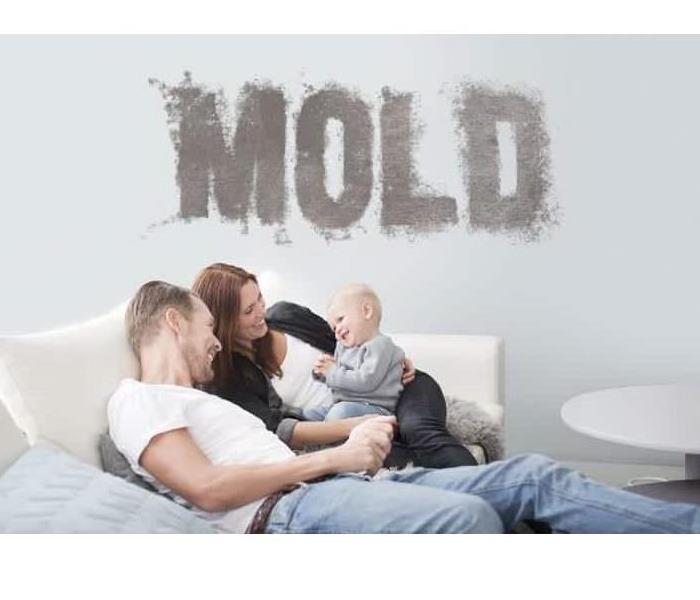 Mold
Mold
Let's be clear, there is no sure proof way to prevent mold however, you can make it less likely to enter your home or business!
- Identify the problem areas. Anywhere that holds water can give mold a chance to grow. Basements that flood, windows and air vents that gain too much condensation, water stains on the ceiling tiles. Simply remove any water damaged items and try to keep water from standing too long in the other areas.
- Keep it dry! Anything wet needs to be dried as soon as possible.
- Make sure that your home has proper ventilation. Most common areas that need good ventilation are your kitchen, bathrooms, basements, and attics. Be sure they have enough air flow to keep things dry and at a decent temperature.
- Install mold resistant products! If you're buying, building, or renovating try using mold-resistant drywall.
- Direct water away from your home.
- Keep roof gutters clean and stable.
- IF you have indoor plants, be sure to check them weekly for mold. Use Taheebo tea mixed with the water when watering your plants to help keep mold away!
For more information check out: https://www.mnn.com/your-home/at-home/stories/how-to-prevent-mold-9-tips
Or go to: https://www.SERVPROmadisoncountyal.com/
Control Moisture to Control Mold
7/17/2019 (Permalink)
MOLDS:
Molds are part of the natural environment, and can be found everywhere, indoors and outdoors. Mold is not usually a problem, unless it begins growing indoors. The best way to control mold growth is to control moisture. This website provides guidance about mold and moisture for homes, schools, multifamily and commercial buildings. Molds can have a big impact on indoor air quality.
https://www.epa.gov/mold
Vacation Tips To Prevent Mold
2/14/2019 (Permalink)
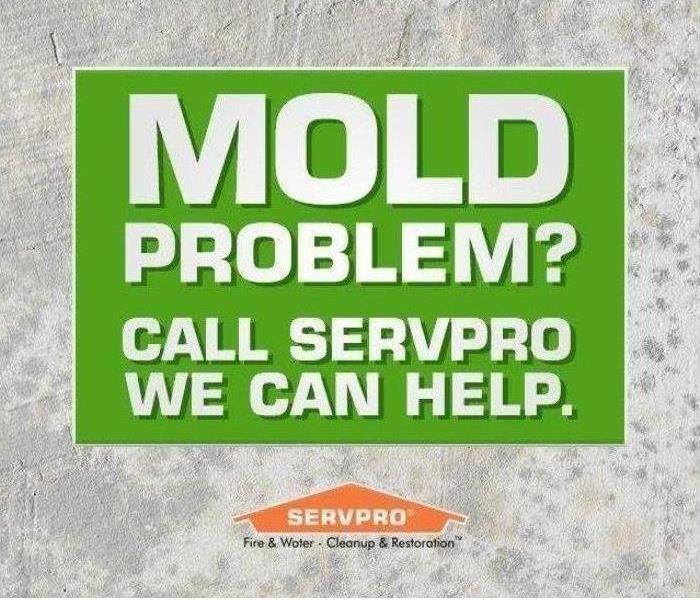
Mold prevention is something that few people think about until the damage is done. Mold growth can occur in less than 48 hours, and water damage can decrease that time significantly. No one wants to come home from a vacation to find that they’ve got a problem, but there are steps you can take to avoid that.
Turn Off Your Water
Turning off the water at the main connection might seem like overkill, but it could save you a headache and a lot of money. One leaky connection or busted pipe can quickly lead to thousands of dollars of water damage, and the wet conditions are ideal for mold growth. Shutting down that possibility is a quick and easy mold prevention measure that everyone can take with just a few common tools.
Turn Down the Temperature
Warm, wet spaces are the best place for mold spores to develop into colonies. Keeping the temperature low in your space may not be entirely comfortable when you get home, but it will negate the possibility that mold will grow and spread in your absence. Turn down your air conditioning, or simply turn off your heating system, and relax in the knowledge that your space will be uncomfortable for any lingering mold spores.
If All Else Fails
Call a professional. Even if you’ve been as proactive as you could be, the unexpected can still leave you with a problem. A do-it-yourself fix might seem like a good option in the heat of the moment, but invariably a professional approach is best when it comes to isolating and mitigating mold. A qualified contractor can use specialized equipment to dehumidify your space, filter the air to remove excess spores, and restore your property to its former glory.
Mold prevention is a simple and often overlooked step when readying for vacation. Be sure you use these tips to avoid mold growth and water damage while you’re away.
Mold Growth Linked To High Indoor Humidity In Alabama
10/2/2018 (Permalink)
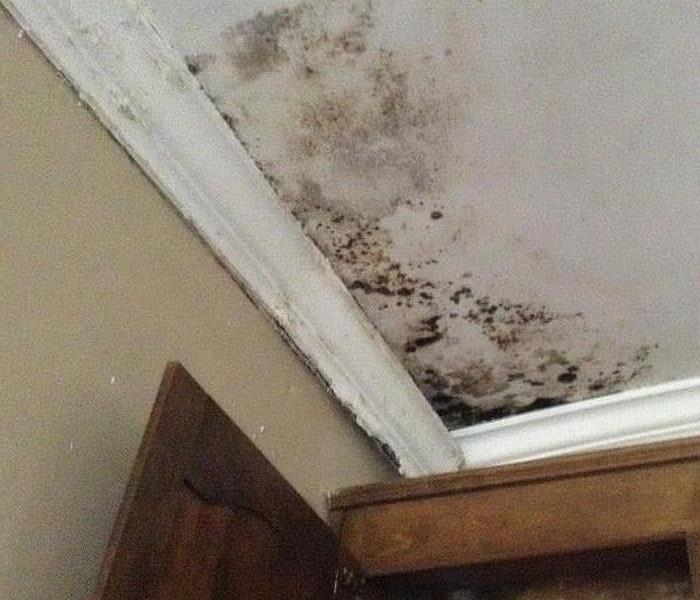 Drywall is one organic material in your home that mold damage can thrive on.
Drywall is one organic material in your home that mold damage can thrive on.
Residents of Huntsville experience long, hot and humid summers. High levels of airborne moisture and warm temperatures indoors can contribute to the increased likelihood of mold growth in your home, even if you have air conditioning operating. Working with a reputable mold remediation company can help you pinpoint the reasons mold growth is an issue in your home and remediate the current growth.
Water is the fuel that accelerates mold damage in your Huntsville/Madison home. Mold spores are very opportunistic, gaining enough moisture from small amounts of dampness or small collections of condensation to begin growth. Running an air conditioner is often recommended to reduce interior humidity below 60 percent, the level where mold can find a supportive environment even without spills, leaks, or flooding.
Ironically, AC units can provide the moisture if operating inefficiently. An air conditioner too small for the area is one problem, but an overly powerful system also can fail to reduce the humidity enough to halt mold development.
Air conditioning provides a cooling feeling when it removes moisture from the air, usually by condensing the water vapor on refrigerated coils. If adjusted correctly and draining properly, the system works well and prevents the conditions conducive to mold growth. Sometimes a larger than necessary unit does not operate long enough to reduce the humidity below the “sweet spot” for mold growth. It pumps cold air into the rooms too quickly and then cycles off before the humidity reduces. Mold then grows on the damp surfaces, necessitating mold remediation by our SERVPRO crews.
Keeping AC condensers and coils clean and the drains free-flowing is also key to preventing interior mold growth during a hot summer. If the drain is plugged, it may overflow, depositing moisture on a wall or floor nearby. Mold finds wood and drywall perfect organic surfaces to call home. SERVPRO inspects for these moisture sources when we arrive to assess and plan for mold remediation. If the homeowner does not address these issues, chances are good that mold can return even after we complete a professional treatment.
SERVPRO of South Madison County is here to help community residents understand why mold finds a home attractive. We design strategies to remove current mold growth while also preventing future outbreaks. Call us at (256) 533-5335 to schedule an evaluation.
Mold Prevention Tips That Work
8/23/2018 (Permalink)
Although there are a variety of challenges that residential and commercial property owners can experience, the presence of mold is particularly problematic. This is the case for many reasons, including the fact that mold can cause health problems and decrease the structural integrity of one’s property. There are ways to prevent the growth of mold, but your best course of action is hiring a professional mold remediation company. Try implementing some or all of the following mold prevention tips:
- Invest In A Dehumidification System.
One of the best ways to prevent the growth and proliferation of mold is to invest in an air conditioner that features a dehumidification system. These systems are effective in removing moisture from your property. Once the moisture is removed, the mold is deprived of one of the vital nutrients that help it grow.
- Be Cautious When Turning The AC Off.
Make sure that you are cautious when you turn off your air conditioner. In climates that are humid, a long-standing period of inactivity can enable humidity levels to become dangerously high. If the humidity level becomes extremely high, it creates the moist environment necessary for mold to grow and thrive.
- Use Insulation.
Another strategy you can use to prevent mold is the use of insulation. By installing insulation as well as vapor barriers, you can prevent condensation from accumulating on objects like plumbing fixtures, beams, and water pipes.
- Avoid Standing Water.
Stagnant water can become a breeding area for mold. Make sure that you keep your tubs, showers, sinks and all other wet regions of your property free of standing water.
Mold can be a severe problem for residential and commercial property owners to handle. However, using the prevention tips and tricks outlined above can help you keep mold from growing. In the event that mold growth does affect your Huntsville home, call a professional restoration company. SERVPRO of South Madison County has extensive experience in the mold remediation field and can assist with your mold restoration needs.
Six Things To Know About Mold In Your Home
8/3/2018 (Permalink)
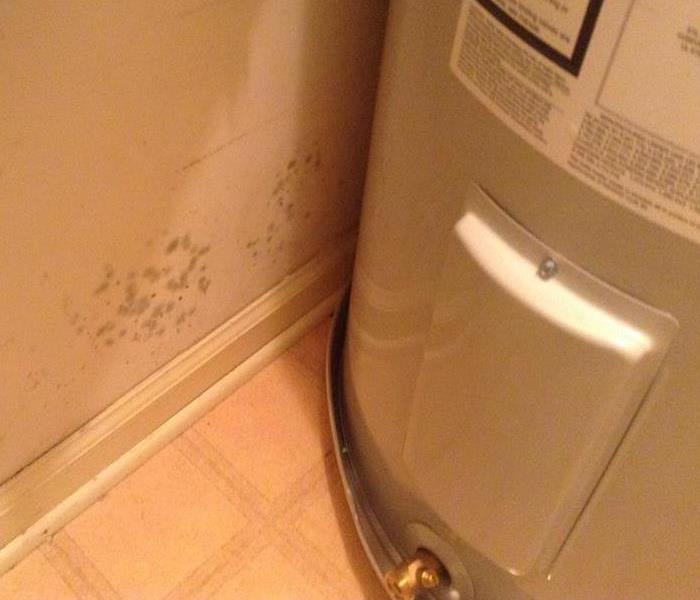
Mold is something most homeowners don't want to learn about. If you know a lot about the fungus, chances are you've had to deal with a mold problem. However, learning about the common household nuisance could help you better understand how to prevent and take care of the issue.
1. It Is Everywhere. Mold spores are a naturally occurring part of the environment. At any given time, you can find spores in the air both indoors and outdoors.
2. It Needs Moisture. A moisture problem could be a great indicator that you have mold in your home. Mold spores need water to really thrive, but even high humidity could do the trick.
3. It Can Spread Quickly. In the right environment, mold spores can become quite active and spread through airflow. This allows the fungus to create colonies all over your home.
4. It Is Smelly. Black mold, and other types of the fungus, often produce a musty odor. If you notice your Huntsville home has started to smell funky, it could be a sign that mold is already in your house.
5. It Is Hard To Clean. The mold cleanup process is not suitable for everyone to undertake. It requires a certain level of technical know-how, which is why you may get the best results by working with a residential mold remediation company.
6. It Can Be Prevented. Moisture control, cleanliness and an eye for detail can help prevent mold growth. If you can't completely prevent the problem, you can at least catch the issue before it spreads further in your house.
As a homeowner, you may be terrified of the thought of mold. You know it can damage your home, reduce your chances of selling and become a recurring problem. Whether you found black mold or you simply want to prevent it, learning more about the fungus can help prepare you for what's next and make the problem a little less scary.
Visit http://www.SERVPROsouthmadisoncounty.com for more information on mold.
Selling A Home & Mold Remediation
7/31/2018 (Permalink)
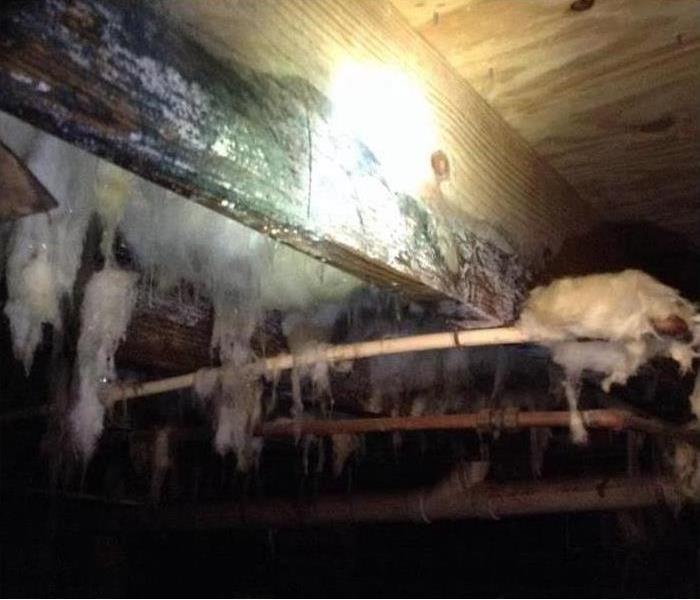 If the house you are trying to sell has mold, call SERVPRO of South Madison County for help 256-533-5335
If the house you are trying to sell has mold, call SERVPRO of South Madison County for help 256-533-5335
Are you trying to sell your house in the Huntsville area this year? We receive numerous calls this time of year from people who are trying to sell their house but need to have mold remediation done before the interested buyer will sign the contract. SERVPRO of South Madison County is HERE TO HELP!
Here are some things you need to know when it comes to mold remediation on the house you are trying to sell:
- Address the Source - If the mold is coming from a leaking hot water heater, no matter how many times we come out to remediate the mold, if the leaking hot water heater does not get fixed, the mold will keep returning.
- Depending on the severity of the mold that is present, it may be necessary to have an Industrial Hygienist come in to test for the types of mold present as well as how high of a count of mold spores are present. Our general rule of thumb is if you have a span of more than 10 square feet of mold, you probably need to have mold testing done. Having this information will allow us to take the necessary steps to get your home back to preloss condition. The final step is to have the Industrial Hygienist come back out and test again to ensure that we have brought the mold spore count back down to an acceptable level.
- We do not test for mold. As a professional mold remediation company, it would present a conflict of interest if we were also the Industrial Hygienist that came in behind ourselves to test the site and claim it as being cleared. We want to avoid any appearance of false test results in order to clear our own work.
Taking the points listed above into consideration, please be sure to allow for enough time for each step as well as the Mold Remediation Process. We know a quick sell is important to you and your satisfaction in our mold remediation service is important to us.
Signs of Mold After Water Damage
5/2/2018 (Permalink)
SERVPRO® of South Madison County handles water damages every day and we know prompt action is required to prevent mold growth. Mold is more likely to spread when an environment has been subject to moisture for a long period of time. If your property has sustained a recent water damage, it is important to be alert for:
- The presence of visible mold
-Strong musty odors which may indicate mold is present
- Any evidence of past moisture problems that might have caused undetected mold growth
- Excessive humidity
These conditions may require the expertise of a qualified Indoor Air Quality Environmental Professional to inspect the building for mold growth.
Some amount of mold spores are normally present in most environments. If the humidity and moisture levels in a water damaged environment are not promptly returned to normal, mold spores may grow and multiply. Organic materials found inside a building, such as wood, paper, drywall and insulation, provide food sources for mold to flourish. Excessive mold growth can lead to indoor environmental conditions that pose a heath threat.
If you suspect you have a mold problem in your Huntsville home or business, give SERVPRO a call to find out how we can help you!
Springtime Tips for Huntsville Homeowners
2/15/2018 (Permalink)
Spring in Huntsville means rain and storms, and for many people that can lead to wet floors or even flooding. Intrusion of water into your home can result in mold growth, if left unattended. The best way to control mold growth is to control the moisture. Following these maintenance tips could save yourself a lot of problems down the line.
- Check your roof for any cracks or damage. This will help prevent leaking into the upper floors of your home.
- Clean and check your gutters. When gutters are clogged and not allowing water to drain properly, it could be coming back into your basement or crawl space.
- If your home has a chimney, have it cleaned and examined for damage.
If these problems are left to sit, your home could be at risk for water damage and potentially mold damage. This could lead to very expensive repairs to both the interior and exterior of your home. SERVPRO of South Madison County recommends keeping up with your household maintenance before the springtime showers begin.
If you find yourself with a soggy or soaked carpet, give SERVPRO of South Madison County a call! We know how to handle your small water damages as well as your large water damages. If you have any questions or need assistance, just call 256-533-5335 and we will answer 24/7!
How Temperature Affects Mold Growth
10/3/2017 (Permalink)
While stopping mold growth is very difficult without adequate tools and training, slowing (or accelerating) expansion could be as simple as changing your thermostat. Mold is hardy by nature, but that does not mean it is invulnerable to environmental changes. The key to controlling mold damage in Huntsville and Madison County could very well be careful climate control. Before calling SERVPRO to your home, consider what each of these conditions can do to affect mold growth.
Warm Temperatures
The ideal conditions for mold damage in Huntsville tend to involve temperatures at or slightly above room temperature. These temperatures are not only the most comfortable for humans, but also for most types of mold. Mold usually grows fastest when your home is in its default state. While cranking up the air conditioning or turning off the heat may help to slow the spread of mold, it will also likely create uncomfortable conditions for you, so consider carefully any changes you make.
Cold Temperatures
Few types of mold grow well in colder climes as warmer ones. In northern parts of the country, the fungi are much more common in the summer, as freezing temperatures present a serious impediment to efficient growth. However, living in low temperatures can create safety hazards, meaning that a cold day only tends to advantage non-climate-controlled parts of the home such as garages and outdoor areas.
Summer Heat
Particularly hot summer days can be either harmful or helpful, depending on conditions. Unfortunately, most hot days in Huntsville tend to carry with them conditions of high humidity, fostering increased mold growth.
If you suspect that your Huntsville home or business has a mold problem, SERVPRO of South Madison County can inspect, assess and remediate your property.
If You See Signs of Mold,
Call Us Today – (256) 533-5335
Tips To Control Mold
8/24/2017 (Permalink)
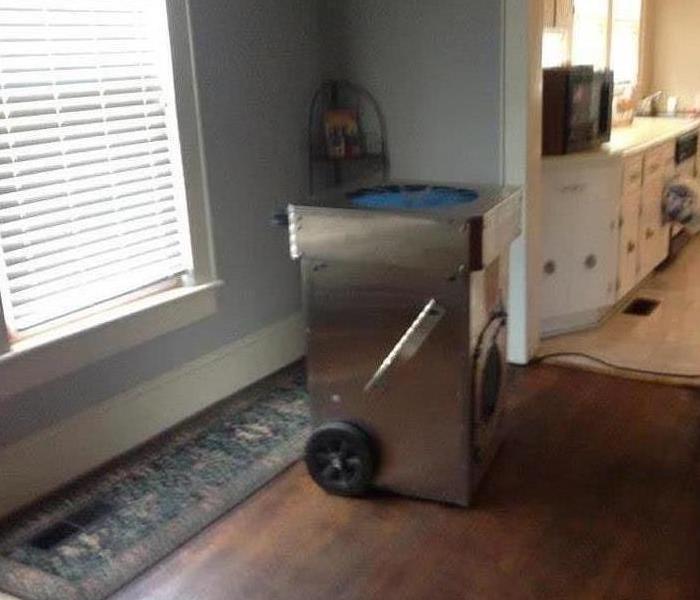 If you suspect that your Huntsville home or business has a mold problem, SERVPRO can inspect, assess and remediate your property.
If you suspect that your Huntsville home or business has a mold problem, SERVPRO can inspect, assess and remediate your property.
As we discussed in our previous blog post, mold is often a problem after a water damage. Many homeowners try to handle water damage cleanup themselves and unseen damage leaves moisture that later causes mold to grow.
If you had a water damage recently and you now smell a musty odor or have visible mold, here are some tips from the Federal Emergency Management Agency (FEMA) to help control mold problems:
- The source of mold is moisture; therefore fix all leaks in pipes and in any damp area around tubs and sinks.
- Rebuild, or retrofit, with water-resistant building materials such as tile, stone, deep-sealed concrete, galvanized or stainless steel hardware, indoor/outdoor carpeting, waterproof wallboard and water-resistant glues.
- Prevent seepage of water from outdoors into your house. It is important to have rainwater from gutters or roof drains away from the structure. Ground around the house should slope away to keep basements and crawl spaces dry.
- Cover dirt in crawl spaces with plastic to prevent moisture from coming up from the ground. Ventilate the area as much as possible.
- Clean fabrics such as curtains and upholstery often to keep them dry, because soil promotes mold growth.
- Consider having ductwork cleaned and inspected professionally or replaced if you suspect mold exists on the inside surface of the duct or if duct insulation has been wet.
- Reduce the moisture in the air with dehumidifiers, fans and open windows or air conditioners.
- Do not use fans or vacuum cleaners if mold already exists, especially in hot weather. A fan or vacuum cleaner will spread the mold spores.
- In moisture-prone areas, choose carpets of man-made fibers.
- Reduce potential for condensation on cold surfaces by insulating.
- Routinely check potential problem spots.
For more information, visit www.fema.gov/removing-mold-your-home.
Stopping Mold Growth
8/4/2017 (Permalink)
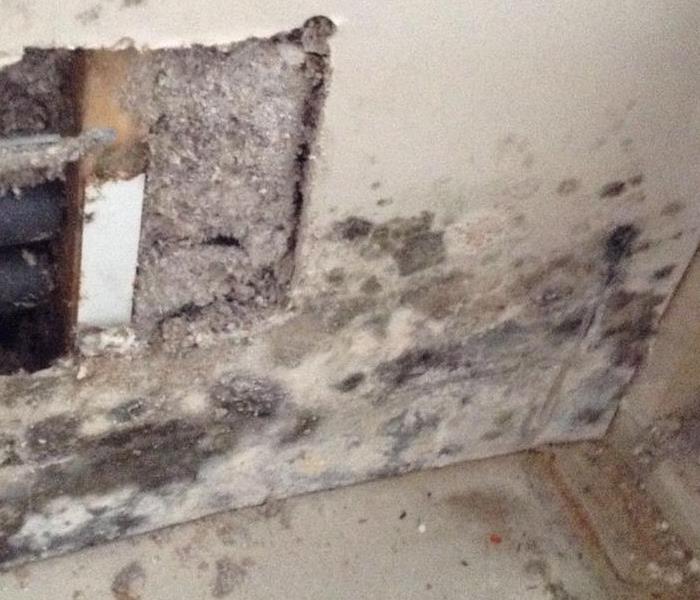 The simplest way to stop mold growth is to reduce moisture.
The simplest way to stop mold growth is to reduce moisture.
Mold growth is not as noticeable as fire or water damage. It can be just as dangerous to residents and destroy as much property if left unchecked and untreated. Stopping the advancement of mold growth, however, is simpler to accomplish for the most part.
To understand how SERVPRO stops mold damage in Huntsville homes and businesses, it helps to know how mold gets started in the first place. Individual mold spores are smaller than a mustard seed, but function in the same manner. A mass containing thousands of them is much smaller than a dandelion, but when it is disturbed, reacts the same way; it breaks apart and spreads the spores (seeds) as far as an air current takes them.
In most cases, these spores touchdown and remain inert, a threat to no one or anything. To expand, they need moisture. The expanding spores extend hyphae across surfaces, seeking a food source so they can grow. When they find one, the spores form a new mass, and the cycle repeats itself, spreading across walls, ceilings, under carpets, and into HVAC ductwork. Most of this takes place between 68 and 86 degrees Fahrenheit, but a few species of mold can grow at high or lower temperatures. To stop growth and render the spores inert, we perform the following tasks: reduce the moisture available, remove the food source and either raise or lower the temperature.
The simplest way to stop growth is to reduce moisture. Our technicians examine the area around it for standing water and measure the humidity level. We use pumps and extractors to remove visible water and draw unseen water from floors and carpets and set-up dehumidifiers to remove moisture from the air.
Removing the food source requires a certain amount of demolition that starts with removing drywall and ceiling tiles. It is simply not cost-effective to try to clean and restore them. If we find mold under a carpet, the same is true.
Changing the temperature is the most difficult factor to manage. Trying to raise or lower the temperature of an affected area can take a long time since it is usually unsafe to engage the HVAC with an active mold growth in the home. In smaller areas, we use heaters to raise the temperature effectively, but even then, we do so as part of reducing the moisture levels.
As a locally owned and operated business, SERVPRO of South Madison County is close by and ready to help with your mold-damaged property. Contact us today at (256) 533-5335 if you need our help or suspect there may be a problem and want to schedule an inspection.
Tips to Prevent Bathroom Mold
8/1/2017 (Permalink)
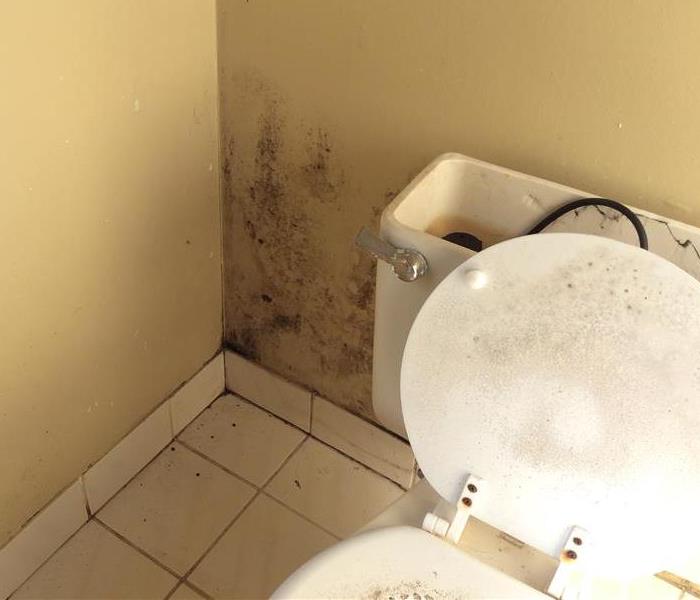 Mold spores thrive on moisture.
Mold spores thrive on moisture.
Ahhhh a hot, steamy shower feels good to achy muscles, washing away your cares for a while. And while you’re relaxing the humidity level in your bathroom is rising, which can create an ideal environment for moldand mildew.
Preventing Mold with a Bathroom Exhaust Fan.
Many people think that the exhaust fan in the bathroom is there to remove away unpleasant odors. While they can help with that, these fans actually serve a much larger purpose. Bathroom exhaust fans draw the moisture-laden air that fills the room after a steamy shower or hot bath out of the bath room, bringing the room’s humidity down to a healthier level. This is a vital step in preventing mold growth and averting mold damage.
Your bathroom is an ideal location for mold because it thrives in a humid environment. One way to ensure that the exhaust fan comes on each time you enter the bath is to have an electrician hard wire the fan to the light switch. But for more efficient way of controlling humidity, invest in a humidity sensor.
Most people turn the fan on when they enter their bathroom to shower and turn it off when they leave. Unfortunately, this does not always give the exhaust fan enough time to evacuate the steam and humidity. Ideally, the fan needs to run until the moisture level in the bathroom is back to normal. You could just leave the fan running and come back later to turn it off, but you run the risk of forgetting it. This wastes energy and can shorten the lifespan of the exhaust fan. Instead, consider installing a humidity sensor. The sensor will automatically cut the fan off when the correct humidity level is restored. It is an easy way to prevent mold damage.
Dealing With Mold
If you find that you have a mold issue in your bathroom, do not attempt to handle it yourself. Disturbing the mold may facilitate its spread and contaminate other areas of your home or business that can be prevented. Spreading and cross contaminating your home or business could end up costing more money in the long run. Instead, turn to the professionals at SERVPRO of South Madison County. Our technicians have the training, specialized equipment, and protective gear to address mold damage. They can inspect the area, identify the source of moisture, contain the mold, remove it, properly cleanse your belongings and restore your home or business to a healthy environment.
Does Your Madison County Home Have A Mold Problem?
5/5/2017 (Permalink)
Microscopic mold spores naturally occur almost everywhere, both outdoors and indoors. This makes it impossible to remove all mold from a home or business. Therefore, mold remediation reduces the mold spore count back to its natural or baseline level. Some restoration businesses advertise “mold removal” and even guarantee to remove all mold, which is a fallacy. Consider the following mold facts:
- Mold is present almost everywhere, indoors and outdoors.
- Mold spores are microscopic and float along in the air and may enter your home through windows, doors, or AC/heating systems or even hitch a ride indoors on your clothing or a pet.
- Mold spores thrive on moisture. Mold spores can quickly grow into colonies when exposed to water. These colonies may produce allergens and irritants.
- Before mold remediation can begin, any sources of water or moisture must be addressed. Otherwise, the mold may return.
- Mold often produces a strong, musty odor and can lead you to possible mold problem areas.
- Even higher-than-normal indoor humidity can support mold growth. Keep indoor humidity below 45 percent.
If your home or business has a mold problem, we can inspect and assess your property and use our specialized training, equipment, and expertise to remediate your mold infestation.
If You See Signs of Mold, Call Us Today – 256-533-5335
Mold and the Precautions to Take
2/16/2017 (Permalink)
SERVPRO® of Central Huntsville handles water damages every day and know prompt action is required to prevent mold growth. Mold is more likely to spread when an environment has been subject to moisture for a long period of time. If your property has sustained a recent water damage, it is important to be alert for:
- The presence of visible mold
-Strong musty odors which may indicate mold is present
- Any evidence of past moisture problems that might have caused undetected mold growth.
- Excessive humidity
These conditions may require the expertise of a qualified Indoor Air Quality Environmental Professional to inspect the building for mold growth.
Some amount of mold spores are normally present in most environments. If the humidity and moisture levels in a water damaged environment are not promptly returned to normal, mold spores may grow and multiply. Organic materials found inside a building, such as wood, paper, drywall and insulation, provide food sources for mold to flourish. Excessive mold growth can lead to indoor environmental conditions that pose a heath threat.



 24/7 Emergency Service
24/7 Emergency Service
